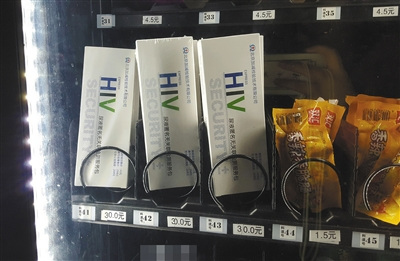Vending machines now sell HIV tests
 |
|
HIV test kits are sold in vending machine. [chinanews.com] |
Students at a Chinese university woke up yesterday to find a surprising new addition in their vending machine. On sale alongside instant noodles and soft drinks were HIV test kits.
Harbin Medical University is the second university in northeast China’s Heilongjiang Province to sell the kits in a vending machine.
It is part of a program launched by the Chinese Association of STD and HIV/AIDS Prevention and Control to address HIV transmission on campus.
Nine such vending machines had been installed in five universities across the country by the end of 2016, the association says.
The machine is designed with a deposit drawer, but looks just like any other, and alongside the kits, sells snacks, cup noodles, and drinks.
A kit is sold at a discounted 30 yuan (US$4.38), compared to 286 yuan (US$41.55) on the market.
Zhao Donghui, an HIV specialist with the province’s Center for Disease Control and Prevention, said a test-taker would buy the kit, collect his urine sample, and drop it back into the deposit drawer.
Staff at the center will be notified by a sensor wired to the drawer. They retrieve the sample, do the test, and post it online.
Only the test taker can view the results once they log on the center’s website and enter a specific code number, Zhao said.
“The whole process is anonymous,” he added.
China had 654,000 people living with HIV/AIDS at the end of September, according to official figures.
Sexual transmission accounted for 94 percent of the 96,000 new cases reported in the nine months to September last year, it said. Students and retirees were the two groups where infection rose most rapidly.
More than 2,320 students aged between 15 to 24 tested positive, more than four times the figure in 2010, it added.
The number of HIV tests in China grew from 60 million in 2010 to 140 million in 2015.
“We can’t eliminate the virus for now, but at least we can prevent it from spreading,” said Wang Mengjiao, a student at Harbin Medical University. “For that purpose, it is important to take part in voluntary testing.”